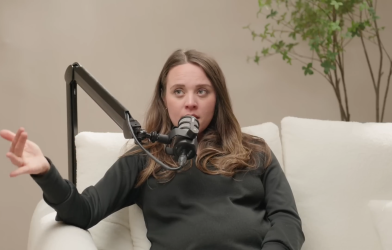How do you remake a story that lives in interpretations?
In “Lost Memories: Silent Hill Chronicle,” a lengthy document published by Konami and Team Silent in 2003, the developers wrote that there’s no canonical ending to the original Silent Hill 2, which has four main conclusions depending on your actions. Many narrative subtleties with regard to the characters, the town outside of cutscenes, and scattered notes found in the game have taken on different meanings for different people. After more than two decades of existing fan theories and meticulously crafted wiki pages, James Sunderland’s story remains a foggy amalgamation of figments.
And now, here is Bloober Team’s Silent Hill 2, reimagined under the norms of the current game industry zeitgeist. Even after the Resident Evil remakes paved the way for the possibility, it’s still odd to see. The initial trailers showcased a familiar yet modernized presentation, switching to an over-the-shoulder camera and snappier, up-to-standard combat. Once previews appeared, developers at Bloober Team reassured every interviewer that it’d be faithful to the original to a painstaking degree — even some members of the original team involved in the remake wanted more changes but were overruled.
During my first playthrough, which lasted over 17 hours, I could sense the designers’ hesitations about what to alter on the walls of every rusty corridor. As you can pick up from my playtime, compared to the 2001 game (which was about 10 hours long), many of the original areas have been expanded. The things you love are, for the most part, still present. But there’s an array of changes, some subtle, some bold, that challenge that familiarity, resulting in an intriguing revisit.
As early gameplay streams seemed to indicate, some encounters — like the first monster sighting inside the tunnel — have been altered. When you interact with certain locations and objects, the game plays a record-scratch animation with a specific music cue. I won’t mention any other example, as they’re fun pockets of nostalgia worth (re)encountering on your own. The implication at large, however, which is capitalized on by some new text entries and collectibles, is that the game is indeed playing around with the idea that you’ve already experienced the events of Silent Hill 2 at least once, both from a story and almost meta perspective as a returning player.
I’d love to tell you in detail how this all plays out in the end, but I can’t. For one, review embargo restrictions prohibit me from describing the new two endings; I can only mention their existence. I couldn’t describe them anyway, though, since I didn’t get either during my first playthrough — it was the “Maria” ending instead. Speaking with peers who also had access to the game before release, these additions are still being unraveled and discovered as other people progress in new game plus and try to find a new collectible type. Somebody out there has likely seen them already, but the details won’t (or shouldn’t) be out in the open until after the game’s release.
The Silent Hill 2 remake doesn’t go to the lengths of Final Fantasy 7 Remake, reimagining a classic in a bold manner to extend the narrative into uncharted territory. James still plunges through the same main areas as in the original. The “Maria” ending remains (roughly) identical. The other endings are in place as puzzles to solve, adding scattered enigmatic pieces for returning players to find, introducing story outcomes to the existing list. But aside from the scavenger hunt experience of finding those endings, there are some fundamental changes to the base game that both expand and, on some occasions, tone down what came before.
On the gameplay side of things, my biggest concerns prior to playing this version were around the camera and overall ambiance, which go hand in hand. The fixed angles of the original were a staple for a reason. Walking down a dark corridor toward the camera without knowing what was in front of you until it appeared in the frame or the angle changed was always terrifying. The environments themselves, such as the iconic Toluca Prison, thrived in the technically limited grittiness of the PlayStation 2 era. The change of perspective to a shoulder camera means being closer to everything and having free rein to explore areas, but I was afraid that it would fundamentally change the oppressive tone of the original.
Thankfully, that’s far from the case. The Silent Hill 2 remake does a great job at asphyxiating you using its new perspective. While you’re now able to choose where to look at all times, enemies can still sneak up on you, with Mannequins doing all sorts of peekaboo interactions — in a similar fashion to Stalkers in The Last of Us Part 2, hiding behind furniture and at times escaping from you after being sighted to find another surprise spot. Changes in traversal, such as having interconnected rooms without doors separated by a loading screen, or spaces to crawl or squeeze through, can also be used by enemies.
It might sound clichéd to talk about darkness in a horror game, but that’s an aspect that the remake captures from the original to a triumph. James’ flashlight can only illuminate so much of the screen, and the flickering of that flashlight, which — like the original — alerts you to moving enemies alongside the radio’s static, is terrifying whenever it momentarily leaves you in a pitch-black room filled with monsters. Their presence can sometimes be a bit too abundant, which at best helps to make you feel unease, such as hearing the constant crawling of Spider Mannequins until you’ve taken them all down or moved somewhere else, and at worst feels like an annoying reminder that the remake has a modern combat system, and the designers introduced more encounters to justify it.
In terms of the story, most cutscenes present changes. In terms of the new character likenesses and voice acting, your mileage may vary. The original game’s campiness, while charming, has been refined, although there’s some stiffness in the way the cast reads lines that feels incidentally faithful. It’s some of the actual story scenes, however, that present a more drastic change.
Silent Hill 2, like the franchise as a whole, depicted mentions of sexual abuse, suicide, and depression, among other dark topics. In Bloober Team’s version, there’s a disclaimer about this each time you start up the game, including a QR code to a Konami site with a list of resources. Yet, some of the most disturbing imagery or direct mentions of said topics during dialogue (especially around Angela, Pyramid Head, and Mary’s videotape) are more subtle now. Considering Bloober’s past track record in games like The Medium, which handled these topics poorly, to say the least, these changes ring as a cautionary method of not repeating past mistakes. None of them change the story per se, but it’s an interesting decision within the context of Silent Hill 2. There’s a case for properly revisiting tropes and depictions that haven’t aged well, including recent cases, like Dead Rising Deluxe Remaster. For Silent Hill, however, lessening the impact of certain moments can make some of the most loose narrative details lose weight while piecing the story together.
But here’s an example of the opposite that ends up being a surprising standout: James’ interactions with Maria when she’s tagging along. Yes, it falls into the AAA trope of an NPC companion not being able to enjoy some quiet time for more than five minutes. But Maria’s new interactions and dialogue are fitting. She comments on certain locations as well as your actions with a fun and flirty flair that serves the character. Being able to properly explore the strip club Heaven’s Night in detail while also getting a new cutscene are additions that carry substance. They’re fleeting, small moments in the grand scheme of main story beats that add a steadier presence without being intrusive.
This subtlety is present in the Silent Hill 2 remake as a whole. Some of the scariest elements of the original are those you couldn’t see or comprehend at first glance. The recurring whispers, the footsteps in the prison, the occasional scream from an unknown person. They all added to the tension without the need to be blunt about it. The designers behind the remake have retained these elements, understanding that having access to better tech doesn’t have to equal constant spectacle. You can now see the rust and mold of Silent Hill in 4K, but higher fidelity doesn’t make any of the locales any more inviting.
It’s an interesting time to revisit Silent Hill 2, considering the original has been in an abandonware state for years now, and the only remastered version available isn’t great. In the official sense, the remake is the current retelling of the story. It’s a faithful interpretation of the events that transpired, capturing most of the big and small story moments while fleshing out some details in between. When considering the legacy of the original game over the past 23 years, however, it’s hard to imagine the Silent Hill 2 remake will be able to replicate that as well, for fans to spend decades discussing its new endings and narrative additions with contrarian analyses. At the very least, it’ll make for another figment to theorize about.
Silent Hill 2 will be released Oct. 8 on PlayStation 5 and Windows PC. The game was reviewed on PlayStation 5 using a pre-release download code provided by Bloober Team. Vox Media has affiliate partnerships. These do not influence editorial content, though Vox Media may earn commissions for products purchased via affiliate links. You can find additional information about Polygon’s ethics policy here.














Comments are closed